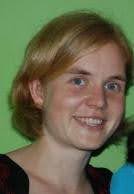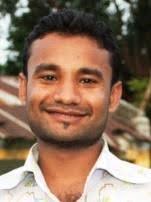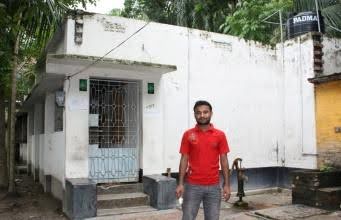Founders

Dr Hafizur Rahman
Founder, EDS, Action researcher, teacher and mentor +47 95 43 94 94 hafiz774@yahoo.com Qualifications PhD Microbiology, NMBU, Norway Pedagogy (children, adults, special needs), NMBU/UiO/OsloMet, Norway ICDP parent guide, Bufdir, Norway MSc Resource management and sustainable development, NMBU, Norway MSc Agronomy, BSMRAU, Bangladesh BSc Agriculture, KU, Bangladesh

Trine Lund
Co-Founder, EDS, Action researcher, teacher and mentor +47 48 39 76 20 trilund@gmail.com Qualifications Pedagogy (children, adults, special needs), NMBU/UiO/OsloMet, Norway ICDP parent guide, Bufdir, Norway MSc Resource management and sustainable development, NMBU, Norway BSc Development studies, UiA, Norway

Md. Alamin
EDS leader, teacher, mentor and action researcher +88 01731601218 alamineds@gmail.com Qualifications BSc Education, TTC, National University, Bangladesh Professional diploma in Disaster Management, KUET, Bangladesh BBA, National University, Bangladesh Diploma in Agriculture, ATI, Bangladesh Awards Ford Motor Company leadership program, New York Rotary Young Leader Award, Norway
More about us
We (Hafiz, Alamin and Trine) founded EDS in 2005, and have since then mentored vulnerable children/youth to become change agents for sustainable development. We conduct collaborative action research (link to Publications) to continuously improve our practice, work in line with our values and create the EDS learning community. Read on to find why we are passionate about empowerment, transformative learning and motivating children/youth to develop their community. I (Hafiz) was born and grew up in Khulna, Bangladesh. The education system was based on rote learning. I was not good at memorizing facts, so my teachers said I could not learn, and only had cow dung in my head. They beat me until I was bleeding and encouraged my classmates to laugh at me. I was so afraid. At night I used to dream that a teacher came to kill me. I asked my parents for help, but they said teachers must beat to make the children learn. This belief, that children learn better when beaten, was shared by my family members, who constantly observed me in order to catch me in doing wrong. Then they would beat me without explanation. I could not stand the pain anymore, so I stopped going to school and instead spent my days at the Khulna University of Engineering and Technology (KUET), near my home. I enjoyed watching the students playing garam board, cricket, and football. They were free to study when they wanted, and nobody beat them. I wanted that free and enjoyable life too.
As a child, I was dreaming of a community where adults made the children feel seen, heard, and valued. Where the children could play, and learning was fun. I did not get that environment, so in 1988 I created it myself. I started a football team with children who had dropped out of school or were at risk of doing so. Many of them begged in the streets or worked in the factories, and they were not interested in going to school to be beaten. They preferred the free life in the streets. We played against other football teams in the district, and one day I told my team that if they wanted to continue to lay with me, they had to go to school. They went to school and in the evenings, I walked around in my village to take them to my home. There, I told them self-invented stories where children were heroes. I played games, and when I had the children’s attention, I started teaching. I used examples from their everyday life to explain the curriculum, and invented songs and rhymes for so they remembered the theory easily. I wanted adults to listen to me and understand my challenges in school and desires to play and be a child. When I observed that adults listened to my older siblings who were university students, I realized that education was the key to be heard. So, in grade 5, I started going regularly to school. When I got a governmental educational stipend due to my good grades, I started feeling that I was able to learn. From that day I never looked back.


Now, I hold a PhD from Norway where I work as a senior teacher at Marikollen secondary school. I know, and have experienced, that everything is possible when you work from your heart and have faith in your dream. I wish to share this message with every child, youth and person living in poverty or facing challenges throughout the world. There is hope, and together we can make it! In 2005, when I went to study in Norway, I was teaching 20 children and asked the oldest, Alamin, to teach the younger. Alamin was in grade 10, shy, lacked teaching experience, had nearly dropped out of school and doubted that anybody would learn from him. I motivated him to develop a friendly and trusting relation to the children through play and teach them in ways that made them enjoy learning. I called Alamin on average three hours daily from Norway, listened to how he had been teaching that day, mentored him to reflect on his results and what he wanted to improve the next day, make a plan and follow it. Initially, everyone, except me, were against Alamin teaching as they did not think that a child could teach. They were afraid our community would hang me if Alamin did any mistake. We did not have any place to teach, so Alamin convinced his parents to let him use his bedroom. The children loved Alamin so increasingly more children came to EDS. When Trine heard that I was motivating children to teach children in Bangladesh, she wanted to support my initiative. In 2005, Trine, Alamin and I established the Education for Deprived Students (now called Education for Development and Sustainability, EDS). Trine offered to donate money to EDS, but I asked her to call my children in Bangladesh instead to motivate them to get education and teach other children.When Hafiz asked me (Trine) to call the EDS children I did not believe my call would make any difference for them (it means I underestimated my potential impact). I had never heard that calling children in another country would bring development, so that did not seem meaningful to me. The main reason that I did not call was probably assumptions I made up myself. I assumed that the children would not understand me as they did not speak well English and the phone line was not clear, so they may not hear me well. I did not know the children and their lives well, so I assumed it would feel awkward to talk with if we would not know what to talk about. So, I did not call. I knew that nobody supported Hafiz’ initiative to mentor children to teach children. People criticized and threatened him, they laughed and said that children can’t teach. So, I knew Hafiz felt alone. Therefore, I thought that if I called the EDS children, I would show that I believed that children could teach, and that may rise Hafiz’ confidence and energy so he could mentor the children better. For that reason, called Ibrahim, but I did not believe my call would impact him in any way.
Ibrahim was a grade 5 student teaching grade 1 students in EDS. I said I had never heard about a child teaching before, so I was very proud of him. After my call, Ibrahim excitedly told Hafiz: “Haiska (the nickname the EDS children had given Hafiz), I have a friend in Norway now! People laugh at me and say I waste my time in EDS because children can’t teach, so nobody will learn from me, but Trine said I am a teacher. So, it’s true!” Although the EDS children did not receive positive encouragement from their families or surroundings, they continued to teach and help other children get education. I came to learn from Hafiz, that for children in Bangladesh, it’s unthinkable that people with high social capital become their friends and care about them. For the EDS children, I had high social capital, and I realized that by being their friend, listen to and care about them, acknowledge and celebrate their achievements with them, I could make a large difference in their lives and personal growth. So, I started calling increasingly more EDS children and became a mentor in EDS.


I (Alamin) never thought I would get higher education, because I dropped out of secondary school and people used to tell me that I was not able to learn, was not good person and would not become anything in life. Hafiz helped me to go back to school and complete my HSC. Now, I have Diploma in agriculture (ATI), BBA and bachelor in education (both National University) and Professional diploma in Disaster management (KUET). I used to think I had no value for others, but with love, motivation and encouragement from Hafiz and Trine, I established EDS and have developed it since 2005. I run EDS daily together with the Youth board. Hafiz and Trine mentor us. I teach school subjects and empower children/youth to become change agents. I mentor the change agents to
- teach in EDS and develop teaching materials and methods
- mentor EDS students to get education and develop ethics, moral and take good decision for their lives
- mentor parents through home visits and parent meetings to create good relations with their children
- collaborate with schools, orphanages, universities, local leaders and police to ensure the child and human rights to safety, education, health, to be seen, heard and to have free time to play
- take care of the EDS administration, accounting, garden, maintain the EDS building and take care of social businesses with fish, poultry and spice
- Due to my commitment and results, I was selected for the Ford Motor Company Leadership training in New York and the Norwegian Rotary Youth Leadership Award.
Alamin started teaching the EDS children in his bedroom. When increasingly more children came to Alamin (up to 200), the space became too small. Then Hafiz bought this house, by money he saved from his Norad scholarship and PhD work, for EDS. Then Alamin started teaching the EDS children here in this house.
Lorem ipsum dolor sit amet, consectetur adipiscing elit. Ut elit tellus, luctus nec ullamcorper mattis, pulvinar dapibus leo.